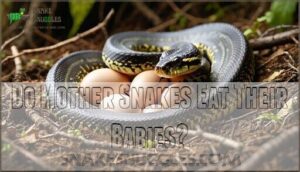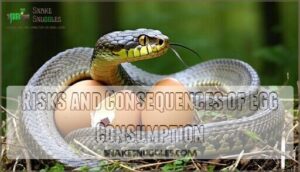This site is supported by our readers. We may earn a commission, at no cost to you, if you purchase through links.

This typically happens when snakes experience stress, illness, or confusion that disrupts their natural instincts.
African egg-eating snakes and other species have specialized adaptations for consuming eggs, but they don’t usually target their own clutch.
In captivity, factors like cramped enclosures, temperature extremes, poor ventilation, or neurological issues can trigger this cannibalistic behavior.
Extreme hunger during food scarcity might also force desperate snakes to consume their eggs as a survival mechanism.
Understanding the specific triggers and environmental factors can help prevent this concerning behavior from occurring, by addressing issues such as cramped enclosures and poor ventilation.
Table Of Contents
- Key Takeaways
- Snake Egg Consumption Habits
- Snake Species That Eat Eggs
- Cannibalism and Egg Consumption in Snakes
- Why Do Snakes Eat Their Own Eggs?
- Mother Snakes and Their Babies
- Prevention of Egg Consumption
- Specific Species Prone to Egg Consumption
- Risks and Consequences of Egg Consumption
- Ensuring a Healthy Environment for Snakes
- Frequently Asked Questions (FAQs)
- Why do snakes eat unfit eggs?
- What do egg-eating snakes eat?
- Do snakes eat their own eggs?
- How do egg-eating snakes survive?
- Do snakes eat their own offspring?
- Are all snake eggs healthy?
- Which snake eats its own eggs?
- Why do snakes eat their own eggs?
- Do snakes eat their own species?
- What happens if a snake eats an egg?
- Conclusion
Key Takeaways
- You shouldn’t panic if your snake eats its own eggs – this isn’t normal behavior and typically happens when they’re stressed, sick, or confused rather than following natural instincts.
- Poor living conditions trigger this behavior – cramped enclosures, wrong temperatures, inadequate humidity, and a lack of hiding spots cause stress that leads snakes to mistake their eggs for prey.
- You can prevent egg consumption by improving their environment – maintain proper temperature gradients (75-85°F), provide adequate space (1.5 times the snake’s length), ensure good ventilation, and remove eggs promptly after laying.
- This behavior signals underlying health or husbandry problems – if your snake eats its eggs, it’s telling you that something’s wrong with their care, nutrition, or environment that needs immediate attention.
Snake Egg Consumption Habits
You might be surprised to learn that snakes don’t naturally consume their own eggs, though it can happen under specific circumstances.
Understanding snake egg consumption habits helps you recognize when this behavior signals underlying problems with your pet’s health or environment.
Types of Snakes That Eat Eggs
Many snake species regularly consume eggs as wild hunters, with some becoming specialized egg predators through evolution.
These reptile diets vary substantially:
- African egg-eating snakes exclusively target bird eggs with specialized adaptations
- Rat snakes frequently raid nests, using excellent climbing abilities
- Kingsnakes practice ophiophagy, eating other snakes’ eggs along with various prey
- Corn snakes opportunistically consume eggs when hunting small mammals
- Garter snakes include fish and amphibian eggs in their diverse diets
These egg-eating snakes have developed remarkable techniques for snake egg consumption, from unhinging jaws to specialized throat structures for processing shells efficiently.
Importance of a Balanced Diet
The balanced diet guarantees your snake’s Nutrient Needs are met beyond simple snake egg consumption.
Dietary Variety matters because eggs alone can’t provide complete Nutritional Balance.
Your snake requires proteins, fats, vitamins, and minerals from multiple sources for peak health.
Think of eggs as treats rather than staples in their Feeding Schedule.
Food Quality and diverse prey items support proper snake nutrition and prevent deficiencies that might trigger unusual snake dietary behavior.
Adaptations for Egg Consumption
Certain snake species have developed remarkable adaptations for egg consumption that make them efficient predators.
These feeding strategies involve specialized jaw structures and digestive processes that allow for ophiophagy.
- Expandable throats – African egg-eating snakes can swallow eggs three times larger than their head diameter
- Throat spikes – Internal projections pierce and drain eggs, rejecting shells through regurgitation
- Enhanced recognition – Specialized chemoreceptors help identify viable eggs through scent detection
These adaptive behaviors demonstrate how snake digestion has evolved for specific dietary niches.
Snake Species That Eat Eggs
You’ll find that several snake species regularly consume eggs as part of their natural diet, though they typically target other animals’ eggs rather than their own.
Rat snakes, kingsnakes, and indigo snakes are among the most common egg predators, using their specialized hunting skills to raid bird nests and reptile clutches in the wild, making them notable egg predators.
Rat Snakes and Their Diet
Rat snakes excel as opportunistic predators, consuming various eggs throughout their territory.
Their Rat Snake Diet includes bird, reptile, and amphibian eggs through skilled Snake Foraging techniques.
These adaptable hunters use climbing abilities for effective Egg Predation during nesting seasons.
Understanding the unique characteristics of egg eating snake behaviors can provide insights into their feeding habits.
| Food Sources | Primary Season | Hunting Method |
|---|---|---|
| Bird eggs | Spring/Summer | Tree climbing |
| Reptile eggs | Late spring | Ground searching |
| Rodent nests | Year-round | Burrowing |
| Amphibian eggs | Early spring | Water edge hunting |
| Snake eggs | Breeding season | Nest raiding |
Their flexible jaws enable Wild Hunting success, swallowing large oval objects whole through specialized throat muscles and backward-facing teeth for grip.
Kingsnakes and Their Prey
Through predation and opportunism, kingsnakes demonstrate sophisticated hunting tactics that make them apex serpent hunters.
These ophiophagic specialists use prey capture techniques involving constriction to subdue both eggs and other snakes, including venomous species.
Their kingsnake behavior centers on snake foraging strategies that prioritize high-protein meals over simple snake egg consumption.
- Snake predation abilities allow them to hunt rattlesnakes and copperheads safely
- Kingsnake diet includes bird eggs, reptile eggs, and various snake species
- Snake eating habits involve swallowing prey whole through powerful jaw muscles
Indigo Snakes and Their Habitat
Eastern indigo snakes thrive in southeastern pine forests, marshes, and wetlands where habitat conservation efforts protect these magnificent predators.
You’ll find these snake egg predators hunting diverse prey including bird eggs, small mammals, and other serpents.
Their indigo diet makes them valuable ecosystem controllers, though wild encounters remain rare.
Understanding snake behavior and snake reproduction patterns helps explain why these indigo snakes rarely consume their own eggs, focusing instead on snake egg consumption from other species within their protected snake habitat.
Cannibalism and Egg Consumption in Snakes
You might be surprised to learn that snakes sometimes eat their own eggs, though this behavior isn’t natural under normal circumstances.
This cannibalistic tendency typically emerges when environmental stress, illness, or captivity conditions trigger abnormal responses that override their usual maternal instincts.
Causes of Cannibalistic Behavior
While different snake species naturally consume various eggs as prey, cannibalistic behavior toward their own eggs represents a concerning deviation from normal maternal instincts.
This troubling phenomenon occurs when specific stress factors overwhelm a snake’s natural programming.
Understanding what triggers this behavior helps you recognize warning signs early:
- Neurological disorders from brain injuries or congenital issues cause confusion, making snakes unable to distinguish between eggs and prey
- Extreme hunger pangs during food scarcity force snakes to consume their own clutch as a survival mechanism
- Captivity effects including overheating, isolation, and confined spaces disrupt natural behaviors, leading to filial cannibalism
Research shows environmental influence plays a major role in egg consumption reasons, with captive snakes displaying this snake cannibalism more frequently than wild populations.
This behavior is also observed in other forms of snake cannibalism cases that raise interesting questions about evolutionary adaptations.
Environmental Stress and Egg Consumption
Under stress, environmental factors can push your snake toward snake egg consumption.
Poor vivarium conditions create Stress Factors that trigger cannibalistic behavior.
Space Confusion and inadequate heating disrupt normal maternal instinct, while Hunger Triggers activate survival responses.
Environmental Impact includes temperature fluctuations and humidity issues that lead to Egg Mistaking behaviors.
Proper understanding of snake health basics is essential to preventing such behaviors.
| Environmental Factor | Stress Response | Result |
|---|---|---|
| Cramped enclosure | Territorial anxiety | Aggressive egg-eating |
| Temperature extremes | Metabolic disruption | Confused feeding behavior |
| Low humidity | Dehydration stress | Survival mode activation |
| Insufficient hiding spots | Constant alertness | Energy depletion |
| Poor ventilation | Respiratory distress | Abnormal behaviors |
Abnormal Behavior in Captivity
Captive snakes often develop abnormal behavior when confined to inadequate spaces or unfamiliar environments.
Improper housing turns natural instincts into destructive confusion
Snake confusion becomes apparent when your pet mistakes its own eggs for prey due to prolonged exposure in cramped quarters.
Environmental factors like poor lighting, incorrect temperatures, or lack of hiding spots trigger captive stress, leading to feeding errors.
Illness compounds these issues, causing egg mistake behaviors where snakes can’t recognize their offspring, resulting in snake egg consumption that wouldn’t occur in nature.
Why Do Snakes Eat Their Own Eggs?
When you’re wondering why snakes sometimes eat their own eggs, you’ll find it’s usually not a natural behavior but rather a response to stress or environmental problems.
This unusual action typically happens when snakes are confused, hungry, sick, or kept in poor conditions that trigger survival instincts.
Stress and Illness
When illness strikes your snake, their normal behavior patterns can shift dramatically.
Sick snakes lose their natural instincts, turning their own precious eggs into prey.
Sick snakes often experience confusion and may not recognize their own eggs as offspring rather than prey. Egg stress from poor environmental factors creates a perfect storm for abnormal captive behavior.
Key stress indicators include:
- Incorrect temperature or humidity levels affecting snake health
- Overcrowded enclosures triggering territorial responses
- Snake diseases disrupting natural maternal instincts
- Inadequate nutrition leading to desperate egg consumption decisions
These health consequences compromise snake egg survival rates substantially.
Mistaking Eggs for Food
Your snake’s keen senses sometimes fail during feeding time, leading to egg confusion where they mistake their own eggs for prey.
This food mistake happens when eggs remain in enclosures during regular feeding sessions, triggering natural hunting instincts.
Snake hunger from inconsistent feeding schedules increases these incidents, while environmental stress and captive behavior disrupts normal recognition patterns.
Snake egg consumption spikes when eggeating snakes encounter their clutches during meal times.
Snakes eating their own eggs through snake egg mistakes occurs more frequently with poor egg eating habits in captivity.
Confusion and Small Spaces
Cramped Small Enclosures create Space Stress that scrambles your snake’s natural instincts.
When Confined Snakes can’t move freely, they lose their ability to properly identify their surroundings.
This confusion leads to Egg Mistake behaviors where they can’t distinguish between food and offspring.
Poor Vivarium Conditions amplify this problem, making snake egg consumption more likely in snake captivity.
Snake stress from tight quarters affects snake egg viability and protection instincts.
Hunger and Lack of Feeding
When hunger strikes and food deprivation sets in, desperate snakes abandon normal feeding behavior patterns.
Starvation effects override maternal instincts, triggering an emergency hunger response where eggs become available protein sources.
Nutrient deficiency from irregular feeding schedules pushes snakes toward snake egg consumption.
Snake nutritional needs demand consistent meals – without proper snake feeding, mothers view their own eggs as survival resources rather than offspring to protect.
Mother Snakes and Their Babies
You might wonder if mother snakes pose a threat to their own offspring after laying eggs.
While most snake species abandon their eggs immediately after laying them, maternal cannibalism can occur under specific stressful conditions in captivity.
Do Mother Snakes Eat Their Babies?
Most mother snakes won’t eat their babies naturally.
Maternal instincts in species like ball pythons actually drive egg protection and baby safety.
However, snake behavior changes under stress – captive mothers might consume offspring when cramped or confused.
Maternal care varies by species, with some showing strong protective behaviors while others abandon eggs immediately after laying them.
Maternal Care in Snakes
While most mother snakes practice egg abandonment after laying, some species demonstrate remarkable maternal behavior.
Snake guardians like pythons showcase strong maternal instincts by coiling around their clutch for weeks, using muscle contractions to maintain uniform temperatures.
These dedicated mothers won’t eat during brood care, prioritizing egg protection over their own needs.
Ball pythons exemplify this reptile reproduction strategy, with females constantly adjusting their position to guarantee uniform warmth distribution.
Their snake parental instincts override hunger, demonstrating that snake egg guarding represents one of nature’s most devoted forms of egg protection behavior.
Protective Instincts in Female Snakes
Protective behavior runs deeper than you might expect in female snakes. Maternal care drives these reptiles to extraordinary lengths for their offspring’s survival. When egg guarding, mothers demonstrate remarkable female behavior that guarantees snake reproductive success. Their brood protection instincts transform ordinary serpents into fierce guardians who prioritize snake offspring survival above their own needs.
Snake nesting mothers exhibit incredible dedication through:
- Snake egg protection involves coiling around clutches for weeks without food
- Snake maternal care includes temperature regulation through muscle contractions that raise egg warmth by 7°F
- Snake egg guarding means striking aggressively at any perceived threats approaching their precious cargo
This devoted protection directly impacts reproductive success rates in the wild.
Prevention of Egg Consumption
Once you understand what causes snakes to eat their eggs, you can take steps to prevent this behavior in your pet snake.
The key is addressing the root causes through proper husbandry, timely intervention, and maintaining ideal conditions in their enclosure.
Removing Eggs Promptly
Swift action saves your snake’s clutch from unnecessary consumption.
Timing matters vitally when implementing egg removal tips – you’ve got a narrow window before snake stress overwhelms maternal care instincts.
Effective snake egg removal requires specialized tools, such as a snake egg remover, to prevent damage to the eggs.
Time Window Risk Level
Use sanitized tools for egg handling to prevent contamination.
Maintain proper temperature during removal – cold shock damages developing embryos.
Quick, decisive vivarium maintenance prevents snake egg consumption while preserving your breeding program’s success.
Improving Enclosure Conditions
Vivarium design that prevents stress-induced egg consumption in your snake is essential.
Poor enclosure conditions create confusion, leading snakes to mistake their eggs for prey.
Essential improvements for snake enclosure setup:
- Temperature Control – Maintain 75-85°F gradients using quality thermostats for proper thermoregulation
- Humidity Management – Keep levels at 50-70% with adequate ventilation to prevent respiratory issues
- Space Optimization – Provide enclosures 1.5 times your snake’s length for natural movement patterns
- Lighting Systems – Use appropriate day/night cycles to regulate natural behaviors and reduce stress
These enclosure conditions support snake health monitoring while preventing abnormal behaviors like egg consumption.
Proper enclosure design is vital for maintaining the overall well-being of snakes.
Monitoring Snake’s Health
Regular health checks catch problems before your snake targets those precious eggs.
Weekly weigh-ins using a snake scale reveal weight fluctuations that signal trouble.
Weight
Shedding
Document these observations in a snake health monitoring log.
Changes in snake nutrition needs, shedding patterns, or behavior often precede snake egg consumption episodes.
Early detection through consistent health checks prevents stress-induced egg eating while supporting proper reptile egg diet understanding and snake reproductive biology.
Specific Species Prone to Egg Consumption
While most snakes don’t naturally eat their own eggs, certain species show a higher tendency toward this behavior under specific conditions.
You’ll find that African egg-eating snakes, Indian egg-eaters, and several common species like ball pythons and corn snakes may consume their own eggs when stressed, ill, or facing food scarcity.
African Egg-Eating Snakes
Fifteen distinct Dasypeltis species across sub-Saharan Africa have perfected egg consumption through remarkable anatomical adaptations.
You’ll discover these African egg-eating snakes possess specialized throat vertebrae that crack eggs internally, allowing them to extract nutrients while expelling shells completely intact.
- Jaw flexibility – Their hinged jaws stretch impossibly wide to accommodate eggs three times their head diameter
- Toothless design – Vestigial teeth prevent shell damage during the delicate swallowing process
- Spinal spikes – Sharp vertebral projections pierce eggs within their throat like nature’s built-in can opener
- Perfect timing – They synchronize feeding with bird breeding seasons for maximum egg availability
- Tree-climbing mastery – Exceptional climbing abilities let them raid nests 30+ feet above ground
Indian Egg-Eater Snakes
Indian egg-eater snakes represent nature’s ultimate egg consumption specialists. These Indian species demonstrate remarkable snake behavior in their wild habitat.
The Indian EggEater possesses extraordinary adaptations for egg eating:
- Specialized throat bones crush eggs internally
- Expandable jaws accommodate eggs three times their head width
- Regurgitation mechanism expels empty shells efficiently
- Unique snake egg consumption allows survival on eggs alone
Unlike other species with varied diets, these snakes showcase dedicated egg eating habits. Their snake egglaying habits don’t interfere with their feeding preferences, making them fascinating examples of evolutionary specialization in egg consumption.
Other Species Under Specific Circumstances
While most snakes don’t naturally consume their own eggs, several species will engage in snake egg consumption under specific environmental factors or captivity stress.
Ball pythons, despite their protective maternal instincts, may eat eggs when severely malnourished. Corn snakes occasionally consume eggs during prey shortages, while water snakes opportunistically raid turtle nests.
| Species | Egg Eating Conditions |
|---|---|
| Ball Pythons | Severe stress, malnutrition |
| Corn Snakes | Prey scarcity, hunger |
| Water Snakes | Opportunistic feeding |
| King Cobras | Resource competition |
These species variations in snake behavior highlight how environmental pressures can override natural reproductive success instincts, affecting snake egg viability factors and overall egg eating habits across snake species diversity.
Risks and Consequences of Egg Consumption
When snakes eat their own eggs, they face serious health consequences that can affect their overall well-being and future reproductive success.
The risks include digestive complications, nutritional imbalances, and potential harm to their reproductive cycle that could impact breeding capabilities for seasons to come, leading to serious health issues.
Health Risks for Snakes
When snakes consume their own eggs, they’re basically playing nutritional roulette with their health. Egg ingestion can trigger a cascade of health consequences that go far beyond simple indigestion.
Snake malnutrition becomes a serious concern because unfertilized eggs lack the balanced nutrition adult snakes need. The calcium-to-phosphorus ratio in eggs creates dangerous imbalances, potentially leading to metabolic bone disease.
Here are four critical health risks from snake egg consumption:
- Nutrient deficiency from imbalanced calcium and phosphorus ratios
- Digestive blockages caused by undigested shell fragments
- Bacterial infections from environmental toxins on eggshells
- Weakened immune system increasing susceptibility to disease.
Non-specialized species lack the anatomical adaptations for safe egg digestion, making them particularly vulnerable. Snake biology simply isn’t designed for this behavior in most species, which explains why health risks multiply quickly. Poor nutrition directly impacts reproductive success and overall longevity.
Impact on Reproduction
Snake egg consumption creates a reproductive domino-effect that you can’t ignore.
When females consume their own eggs, clutch sizes shrink dramatically, reducing breeding success rates.
This egg abandonment behavior disrupts natural maternal care patterns and compromises egg viability.
Reproductive stress from environmental factors often triggers this consumption, creating a vicious cycle.
Your snake’s reproductive ecology depends on successful egg incubation, but snake egg consumption derails these carefully-evolved reproductive strategies.
Each consumed egg represents lost genetic investment, making future breeding attempts increasingly challenging for affected females.
Egg Consumption Clutch Size
Hatching Rates
Survival Rates
Potential for Malnutrition
Malnutrition becomes a serious threat when snakes rely too heavily on eggs alone.
Snake egg nutrition lacks essential nutrients found in their natural prey, creating dangerous dietary imbalance.
Malnourished snakes face these critical risks:
- Nutrient deficiency affecting organ function
- Stunted growth in developing snakes
- Weakened immune systems increasing disease susceptibility
- Starvation effects leading to organ failure
Egg deprivation of proper nutrition compromises snake nutritional needs, making balanced feeding essential for survival.
Understanding egg eating snake facts is vital to addressing these nutritional concerns.
Ensuring a Healthy Environment for Snakes
Creating a healthy environment prevents your snake from eating its own eggs and guarantees proper reproductive behavior.
You’ll need to maintain correct temperature, humidity, and space while providing proper nutrition to reduce stress-induced egg consumption.
Providing Proper Care and Nutrition
Proper snake nutrition starts with species-appropriate prey and consistent feeding schedules. You’ll want dietary variety – mixing rodents, birds, or fish based on your snake’s natural diet. Nutrient balance matters too; calcium supplementation prevents deficiencies that trigger snake egg consumption. Environmental enrichment like hiding spots and climbing branches supports natural foraging behaviors. Quality snake care means matching portion sizes to body weight and avoiding overfeeding, which stresses digestive systems and encourages abnormal eating patterns. Additionally, providing the right snake food supplements (https://zon.everysimply.com/Snake+food+supplements/dp/) is crucial for a snake’s overall health, however the correct format is: providing the right snake food is crucial for a snake’s overall health.
Minimizing Stress and Anxiety
Reducing snake stress factors prevents egg consumption behaviors through careful Environmental Enrichment.
Stress Reduction requires:
- Habitat Optimization with proper hiding spots and temperature gradients
- Anxiety Prevention through consistent feeding schedules and minimal handling
- Snake Calming environments with appropriate substrate and lighting cycles
- Regular monitoring of snake maternal behaviors during breeding season
- Implementing snake egg protection methods to reduce territorial stress
These practices address snake egg consumption reasons effectively.
Creating a Suitable Habitat
A well-designed enclosure serves as your snake’s sanctuary, directly preventing stress-induced behaviors like eating snake eggs.
Proper Habitat Design requires balancing multiple Environmental Factors to create suitable Vivarium Conditions. Your Snake Enclosures should maintain consistent snake temperature between 75-85°F and snake humidity levels of 50-60%.
Adequate Space Requirements allow natural movement, while substrate choice affects snake incubation success. The snake environment needs hiding spots, climbing branches, and water dishes to reduce anxiety.
Creating a suitable snake environment involves understanding key temperature control systems to guarantee the health and well-being of your pet.
Essential habitat components include:
- Temperature gradients with basking and cool zones
- Humidity monitoring systems for consistent moisture
- Multiple hiding places for security
- Appropriate substrate depth for burrowing species
- Clean water sources changed regularly
Frequently Asked Questions (FAQs)
Why do snakes eat unfit eggs?
Something’s not quite right when you discover your snake’s consumed her own eggs.
Snakes eat unfit or infertile eggs to prevent bacterial contamination that could spread to viable eggs in the clutch, while reclaiming lost nutrients.
What do egg-eating snakes eat?
Egg-eating snakes consume bird eggs exclusively, using specialized throats to swallow eggs whole.
You’ll find African egg-eating snakes and Indian egg-eaters have adapted jaws that expand remarkably to accommodate eggs much larger than their heads, which is a notable adaptation.
Do snakes eat their own eggs?
Rarely do mother snakes turn into their own worst nightmare.
You’ll find snakes don’t typically eat their own eggs, but stress, illness, or infertile eggs can trigger this unusual behavior in captivity.
How do egg-eating snakes survive?
You’ll find specialized egg-eating snakes thrive by consuming bird eggs exclusively, using their flexible jaws to swallow eggs whole.
They also have special throat structures to puncture shells while regurgitating empty shells afterward, which is a unique adaptation that allows them to swallow eggs whole.
Do snakes eat their own offspring?
Like nature’s harsh editor, snakes sometimes consume their own offspring.
You’ll find this occurs mainly when mothers are stressed, hungry, or confined in poor conditions that trigger survival instincts over parental care.
Are all snake eggs healthy?
No, not all snake eggs are healthy.
You’ll find some eggs are infertile slugs that won’t develop properly.
Others become diseased or damaged during incubation, making them nonviable for hatching successfully.
Which snake eats its own eggs?
Most snakes don’t naturally consume their own eggs, but stressed, sick, or hungry mothers sometimes do.
Ball pythons, corn snakes, and kingsnakes may eat infertile eggs when confined in poor conditions or facing starvation.
Why do snakes eat their own eggs?
Stress, illness, or hunger can drive your snake to eat its own eggs as a survival mechanism.
Environmental issues like poor temperature, cramped spaces, or detecting infertile eggs also trigger this behavior.
Do snakes eat their own species?
Nature’s food web operates like a complex puzzle where some pieces surprisingly consume others.
Yes, you’ll find that certain snake species do eat other snakes—this behavior’s called ophiophagy, and it’s quite common among kingsnakes, coachwhips, and some pythons in wild habitats, exhibiting a unique aspect of wild habitats.
What happens if a snake eats an egg?
When you see a snake consume an egg, it’ll swallow the whole thing using its flexible jaw joints.
The egg travels down their throat, where specialized throat bones puncture it, allowing contents to flow into their stomach while they regurgitate the empty shell.
Conclusion
While most snakes naturally avoid consuming their own eggs, stress and poor environmental conditions can trigger this concerning behavior.
Understanding why snakes eat their own eggs helps you create better living conditions for captive reptiles.
You can prevent egg consumption by maintaining proper temperatures, providing adequate space, ensuring regular feeding schedules, and removing eggs promptly after laying.
These simple steps protect both mother snakes and their offspring from unnecessary harm, and following them is crucial for the well-being of captive reptiles, and can help prevent the concerning behavior of snakes eating their own eggs.
- https://timesofindia.indiatimes.com/etimes/trending/why-do-snakes-eat-themselves-alive-the-scientific-reason-is-stranger-than-you-think/articleshow/122075277.cms
- https://www.reddit.com/r/snakes/comments/1lo52ws/do_snakes_eat_their_own_eggs/
- https://www.cnhtours.com/news/2021/10/1/evidence-of-cannibal-snakes-in-galapagos/
- https://roundglasssustain.com/columns/king-cobras-mates-cannibalism
- https://pmc.ncbi.nlm.nih.gov/articles/PMC11949763/


















